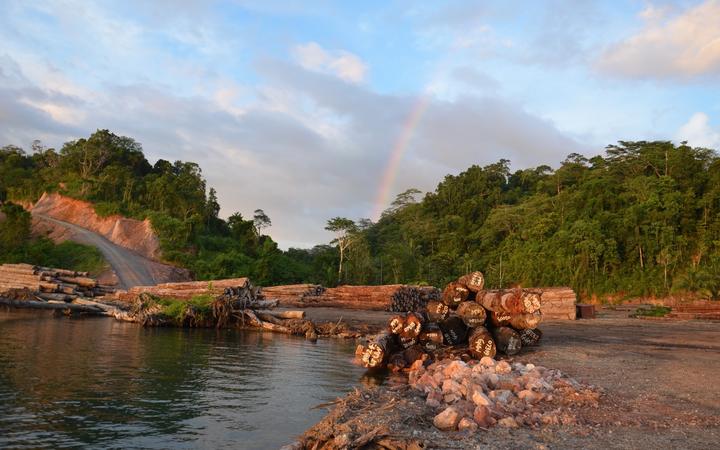A planned rubber plantation on Papua New Guinea’s Manus Island could be a front for illegal logging, a new report claims.
‘Bending the Truth,’ by anti-corruption watchdog Global Witness, is the culmination of an investigation into the Pohowa Integrated Agro-Forestry Project.
The report alleged company Maxland, a subsidiary of Malaysian owned Joinland, was not honouring its commitment to establish a 1333-hectare rubber plantation on the island. Instead it was alleged to be selectively logging tropical hardwood for export.
Global Witness’s Lela Stanley said investigators visited the project site in October 2019 and found no rubber trees had been planted.
“If the company were putting a rubber plantation in, according to schedule they should be clearing the area and planting seedlings at a rate of approximately a million per year,” Ms Stanley said.
“When we visited, they had cleared under 100-hectares as opposed to over 1000 that they should have done at that point in order to plant the seedlings they needed to.”
Satellite imagery supported the findings, along with evidence 1000 hectares of forest was being “selectively logged”, Ms Stanley said.
“Maxland has a forest clearance permit and it was granted with the intention of the company developing an agricultural project.
“What we see instead is selective logging. They’re going into the forest, cutting down valuable hardwood trees and dragging them out.”
A
t stake were forests that absorbed climate changing carbon dioxide, hunting grounds and “Papua New Guinea’s exceptional biodiversity”, the report said.
“The International Union for the Conservation of Nature, considers [Manus] island to contain two key biodiversity areas. Its endemic species include a brilliant green tree snail used to make jewellery and the Manus chauka, a friarbird that adorns the provincial flag. Manus’ biodiversity includes the Admiralty cuscus, unique to the archipelago and the Manus masked owl.”
Maxland was granted a permit for its five-year project by the PNG National Forestry Board in December 2017, despite its proposal being rejected by the Manus Provincial Forest Management Committee, the report said.
“It looks like the national forestry board went over the head of the provincial committee. There’s no provision in the Forestry Act that allows that to happen,” Ms Stanley said.
The report, therefore, alleged the company held an unlawful clearance permit, an allegation the Forestry Board did not respond to, Ms Stanley said.
By October 2019, Maxland had declared log exports worth about $US1.85 million, according to the report, yet was not achieving objectives laid out in its own documents.
“The company’s documentation that we have sighted commits them to planting between three and five million rubber seedlings over the course of a five year project,” Ms Stanley said.
“They also committed to putting in place roads in the area that would help to connect communities on the south coast of Manus to a road network leading to Lorengau, the capital.”
The only roads that have been built so far, however, are forestry roads and another from the logging camp to the wharf, Ms Stanley said.
“Those are poor quality roads that are not going to help the community out after a couple of seasons of rain and certainly not once the company packs up its operations and eventually leaves.”
The report pointed to a similar project undertaken by Joinland on New Hanover island in PNG’s New Ireland province. From there, the report claimed over $US50 million of logs were exported, “the wrong variety” of rubber trees were planted, river systems were spoiled and locals received “next to nothing”.
Global Witness contacted the owners of Joinland for comment on the allegations contained in the report.
“We deny the accusations,” they replied. “All our projects in Papua New Guinea are granted by the National Forest Authority and monitored by the government.”
The report recommended better due diligence from three Malaysian banks it says are funding Joinland, and from financiers that back the backs, including the Norwegian Pension Fund.
“The banks should be screening all of their projects for risks, including the risk of funding deforestation… global financiers should be doing the same thing,” Ms Stanley said.
“That’s why we are arguing that governments should be holding them accountable by putting in place regulation that insists financiers do due diligence to check on their own investments to make sure they are not investing in these destructive activities.”
The Norwegian Pension Fund told Global Witness it had published expectations of the companies it invested in.
“We expect companies engaged in activities with a direct or indirect impact on tropical forests to have a strategy for reducing deforestation.”
China, which the report said was the biggest buyer of logs from the project, was also targeted in the recommendations, as was PNG.
“China’s recently revised Forest Law could provide an opportunity to crack down on the trade in illegally harvested timber. For the first time it makes clear that no one should purchase, process or transport illegally produced timber – it is now crucial to clarify that this includes timber sourced overseas.
“The PNG government should hold those responsible for breaking the law to account, by investigating, prosecuting, and fining and/or jailing directors, officers, and companies involved. It should also attempt to reclaim the proceeds of any timber deemed to have been cut illegally and establish a mechanism to return these funds to affected landowners.”






